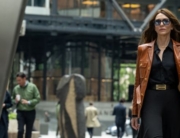![]() The boldness and artistry on display in Vietnamese director Thien An Pham’s film is quite astonishing, especially for a debut. It begins with a striking opening of rich compositions and depths of field. At night, someone in a mascot costume moves through a Saigon outdoor eatery beside a soccer field as a group of men conversate—one of whom, the unassuming Thien (Le Phong Vu), will be become the protagonist. Suddenly, a motorbike crash happening out of frame interrupts this urban dailiness. Some of the crowd’s reaction is one of horror, yet most are less emotional, as if reacting to a commonplace experience. (It’s later insinuated that Thien’s sister-in-law is one of the victims, of which, in the moment of the crash, Thien nor the audience are aware.) It’s such an arresting scene, with details that are worth revisiting, that the rest of the picture has a lot to live up to. Nevertheless, the lingering long takes; the sophisticated, yet naturalistic blocking of the actors; and the element of surprise are all frequent and lovely facets within Pham’s nuanced and patient film.
The boldness and artistry on display in Vietnamese director Thien An Pham’s film is quite astonishing, especially for a debut. It begins with a striking opening of rich compositions and depths of field. At night, someone in a mascot costume moves through a Saigon outdoor eatery beside a soccer field as a group of men conversate—one of whom, the unassuming Thien (Le Phong Vu), will be become the protagonist. Suddenly, a motorbike crash happening out of frame interrupts this urban dailiness. Some of the crowd’s reaction is one of horror, yet most are less emotional, as if reacting to a commonplace experience. (It’s later insinuated that Thien’s sister-in-law is one of the victims, of which, in the moment of the crash, Thien nor the audience are aware.) It’s such an arresting scene, with details that are worth revisiting, that the rest of the picture has a lot to live up to. Nevertheless, the lingering long takes; the sophisticated, yet naturalistic blocking of the actors; and the element of surprise are all frequent and lovely facets within Pham’s nuanced and patient film.
The story is more of a spiritual, personal, and familial journey rather than a complicated plot: Thien (in his late twenties or early thirties), leaves Saigon to sojourn back to the verdant, mist-covered mountainous terrain of his rural roots with his nephew, Dao (Nguyen Thinh), and the ashes of Thien’s sister-in-law, Dao’s recently departed mother. Thien is also in search of his brother, Dao’s father, who has been long absent from their lives.
Although the pace and hazy storyline requires a patient viewer, Pham’s direction, and the hypnotic camerawork by Dinh Duy Hung, sometimes borders on the sublime. In an elongated take, through an open window, an older gentleman (Mr. Luu) recalls his experiences in war as the camera closes in so slowly that it’s almost imperceptible. Luu is a local non-actor, known in his community for his storytelling. That Pham crystalizes Luu’s stories in seemingly one take is a testament to Pham’s sensitivity and care as a director.
One quietly exhilarating sequence is a dream from the point of a view of a motorcyclist on winding town roads, the fog thickening as headlights of fellow cyclists in the opposite lane beam like orbs. With the knowledge of the film’s previous crash, there is a breathless tension in this tight POV: Will this motorcycle crash as well? Though not overtly, the film is constantly in conversation with present and past, the natural with the urban world. (In Saigon, Thien’s attempt to connect with the transcendent—so intrinsically rooted in nature—is a trip to a masseuse’s cramped room of dingy, rain-glazed windows.)
At the New York Film Festival, where I first viewed the film, the elegant framing, the long takes, and the eclectic soundscapes were particularly captivating in a theatrical setting, almost inducing a trancelike state. The effect is diluted somewhat on a smaller screen, but still, this feels like it will be an enduring film of a vibrant new voice.

















Leave A Comment